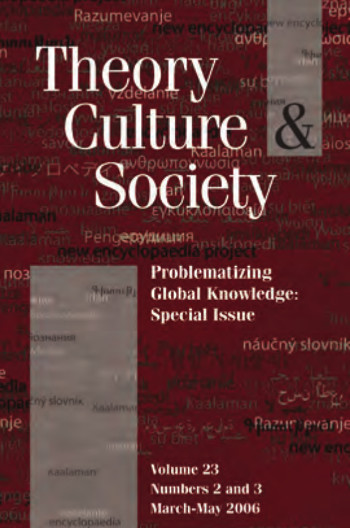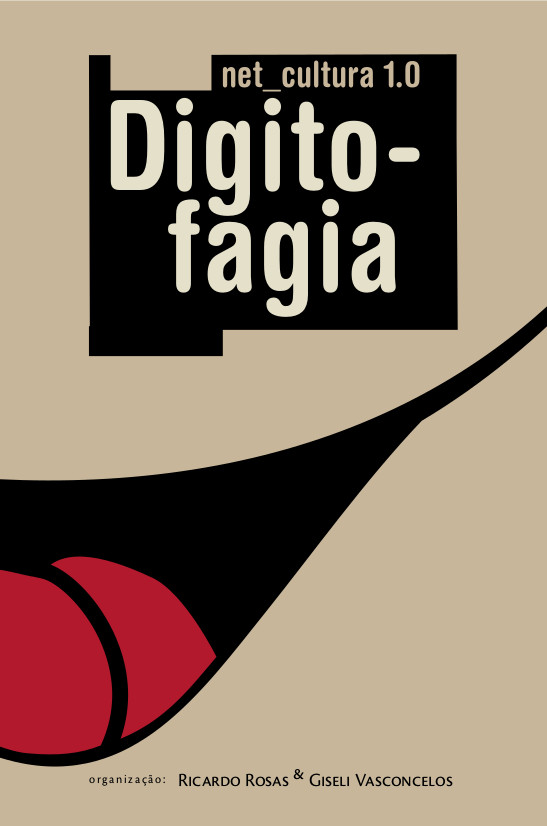Theory, Culture & Society 23(2-3): Problematizing Global Knowledge (2006)
Filed under book, journal | Tags: · aesthetics, archive, assemblage, body, classification, culture, encyclopedia, globalisation, information, knowledge, knowledge production, language, library, life, logic, media, modernity, network, public sphere, race, religion, science, space, technology, theory, time, translation, university, vitalism

In this special issue the TCS editorial board, along with colleagues in East and South-East Asia and other parts of the world, ventured in ‘encyclopaedic explorations’ in order to “rethink knowledge under the impact of globalization and digitization. The issue features over 150 entries and supplements on a range of topics which are addressed in terms of their relevance to knowledge formation, by contributors writing from a wide range of perspectives and different parts of the world. The entries and supplements are gathered under three main headings: metaconcepts, metanarratives and sites and institutions.”
Edited by Mike Featherstone, Couze Venn, Ryan Bishop and John Phillips, with Pal Ahluwalia, Roy Boyne, Beng Huat Chua, John Hutnyk, Scott Lash, Maria Esther Maciel, George Marcus, Aihwa Ong, Roland Robertson, Bryan Turner, Shiv Visvanathan, Shunya Yoshimi
With an Introduction by Mike Featherstone and Couze Venn
Publisher Sage, 2006
616 pages
Ricardo Rosas, Giseli Vasconcelos (eds.): net_cultura 1.0: Digitofagia (2006) [BR-PT]
Filed under book | Tags: · activism, anthropophagy, art, brazil, cyberfeminism, digital culture, hacktivism, media activism, politics, tactical media, technology, web

A collection of essays contextualizing actions and initiatives in Brazil’s net culture and hacktivism, edited by the late Ricardo Rosas and Giseli Vasconcelos and coming out of their experience creating Festival Digitofagia in 2004.
“Digitofagia é resultado de um processo coletivo de pensamento gerado durante a concepção, planejamento e realização de um festival de mídia tática, no Rio de Janeiro e em São Paulo, no ano de 2004, que discutiu, entre outras coisas, a necessidade urgente de “abrasileirar” práticas de mídia-ativismo que até então eram teorizadas, praticadas e planejadas sob a influência de teorias e práticas aparentemente alheias ao contexto brasileiro.
A concepção de Digitofagia foi pensar uma pratica antropofágica que se reatualiza no contexto da cultura digital, reabastecendo seu viés libertário. Para tanto, abraçar práticas espontâneas na cultura contemporânea brasileira, como a pirataria, os camelôs e a gambiarra, seria, quem sabe, formas de trazer a mídia tática para um campo mais familiar e mais cotidiano aos praticantes, teóricos e activistas brasileiros. Afinal, a própria cultura brasileira é um codigo (em) aberto.”
“Composto por 35 textos de escritores, ativistas, pesquisadores, acadêmicos e artistas preocupados com os caminhos do ativismo político-artístico nos tempos da globalização digital, Digitofagia é fruto da inesgotável energia e alegria de Ricardo Rosas (1969-2007), que primeiro pensou e organizou, ao lado de Giseli Vasconcelos, os textos selecionados para este volume.”
Publisher Radical Livros, São Paulo, with Sarai/CSDS, Delhi, and Waag Society, Amsterdam, 2006
Creative Commons BY-SA-NC 2.5 Brazil
ISBN 8598600048, 9788598600048
347 pages
Commentary: Paul Keller (2009), Geert Lovink (2009).
Comment (0)Journal of Aesthetics & Culture, 4: From Sign to Signal (2012)
Filed under book | Tags: · aesthetics, art theory, electronic art, film, interface, media, media art, media technology, new media, semiotics, sign, signal processing, technology, theory

“Since the 1990s there has been intensified focus on the concepts of performativity, the relational, and affect in the humanities. Scholars from different fields have in a variety of ways embraced these notions in their accounts of contemporary culture, and as such they also form the backdrop of this thematic collection of articles entitled From Sign to Signal. It seems, however, as if today’s media situation–the globally evident usage of media technologies–requires a new theoretical approach in order to deal with the intersections of technology and aesthetics, since in these cases the sign often falls short. It has therefore been the ambition of this collection to invite scholars within the humanities to take part in a discussion on the implications of a gradual shift from a (linguistically framed) paradigm of the sign to a new paradigm connected with media augmented environments.
As the term for this new paradigm we have chosen the ‘signaletic material’, coined by Gilles Deleuze in his book Cinema 2: The Time-Image. Deleuze developed this notion in order to stress that film in his view of contemporary or modern cinema had altogether eliminated classical (literary) thoughts of plot and narration. Toward the end of Cinema 2 it becomes clear that the notion of the ‘signaletic material’ might be developed to cover all kinds of filmic and electronic material as well as the emerging new media technologies.” (from Foreword)
Edited by Bodil Marie Stavning Thomsen, John Sundholm and Ulla Angkjær Jørgensen
Publisher Co-Action Publishing, Järfälla, Sweden, 2012
Creative Commons CC-BY 4.0 License
eISSN 2000-4214
134 pages
HTML, PDFs (updated on 2017-10-27)
single PDF

